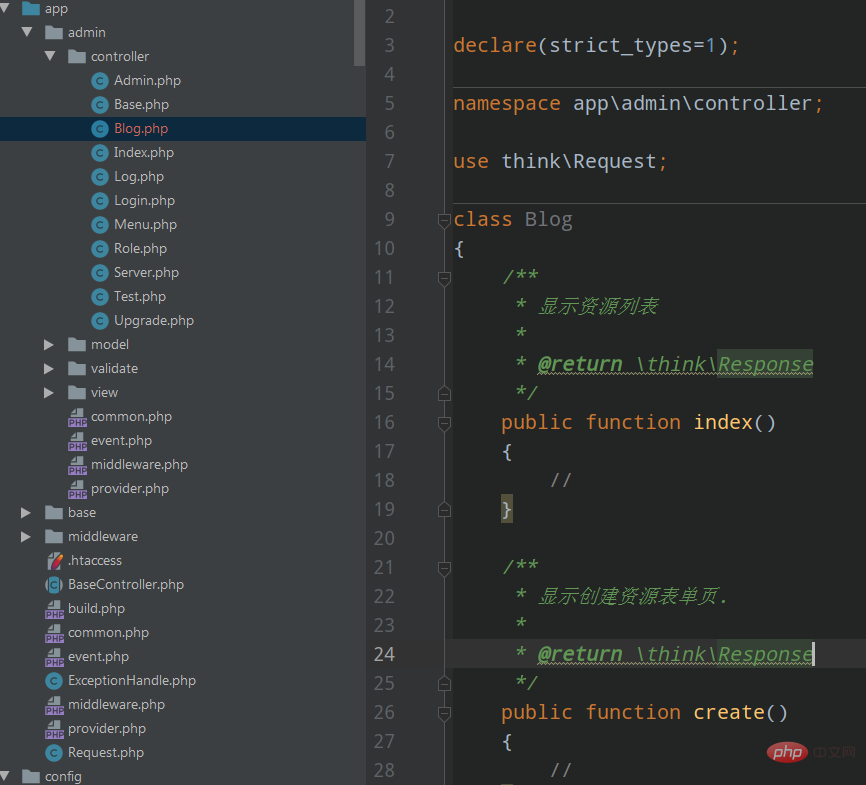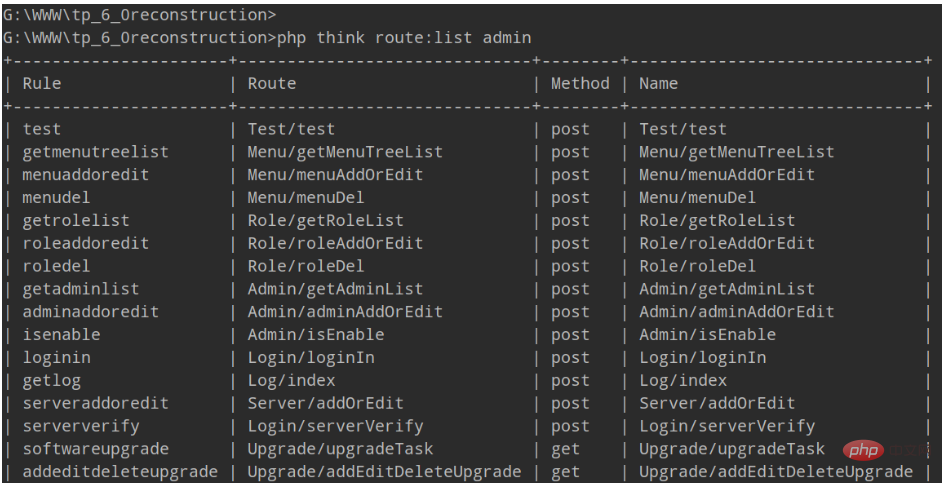Commonly used scaffolding commands in TP6
The following tutorial column of thinkphp framework will introduce to you the scaffolding commands commonly used in TP6. I hope it will be useful to friends who need it. help!

1. Create middleware:
php think make:middleware /admin/Upgrade
/admin/Upgrade Create the middleware for the Upgrade.php file in the admin directory
2. Create a controller:
php think make:controller admin@Blog
Create a Blog controller under the admin module:

3. View the routing list
php think route:list admin
View Routing under the admin module:

# List of common commands:
指令 build 自动生成应用目录和文件 help 帮助 list 指令列表 clear 清除缓存指令 run 启动PHP内置服务器 version 查看当前框架版本号 make:controller 创建控制器类 make:model 创建模型类 make:command 创建指令类文件 make:validate 创建验证器类 make:middleware 创建中间件类 make:event 创建事件类 make:listener 创建事件监听器类 make:subscribe 创建事件订阅者类 make:service 创建系统服务类 optimize:autoload 生成类库映射文件 optimize:config 生成配置缓存文件 optimize:schema 生成数据表字段缓存文件 optimize:facade 生成Facade注释 route:build 生成注解路由 route:list 查看路由定义 service:discover 自动注册扩展包的系统服务 vendor:publish 自动生成扩展的配置文件
The above is the detailed content of Commonly used scaffolding commands in TP6. For more information, please follow other related articles on the PHP Chinese website!

Hot AI Tools

Undresser.AI Undress
AI-powered app for creating realistic nude photos

AI Clothes Remover
Online AI tool for removing clothes from photos.

Undress AI Tool
Undress images for free

Clothoff.io
AI clothes remover

AI Hentai Generator
Generate AI Hentai for free.

Hot Article

Hot Tools

Notepad++7.3.1
Easy-to-use and free code editor

SublimeText3 Chinese version
Chinese version, very easy to use

Zend Studio 13.0.1
Powerful PHP integrated development environment

Dreamweaver CS6
Visual web development tools

SublimeText3 Mac version
God-level code editing software (SublimeText3)

Hot Topics
 1378
1378
 52
52
 Composer's advanced features: aliases, scripts, and conflict resolution
Jun 03, 2024 pm 12:37 PM
Composer's advanced features: aliases, scripts, and conflict resolution
Jun 03, 2024 pm 12:37 PM
Composer provides advanced features, including: 1. Aliases: define convenient names for packages for repeated reference; 2. Scripts: execute custom commands when installing/updating packages, used to create database tables or compile resources; 3. Conflict resolution: use priorities Rules, satisfaction constraints, and package aliases resolve the different requirements of multiple packages for the same dependency version to avoid installation conflicts.
 Agile development and operation of PHP microservice containerization
May 08, 2024 pm 02:21 PM
Agile development and operation of PHP microservice containerization
May 08, 2024 pm 02:21 PM
Answer: PHP microservices are deployed with HelmCharts for agile development and containerized with DockerContainer for isolation and scalability. Detailed description: Use HelmCharts to automatically deploy PHP microservices to achieve agile development. Docker images allow for rapid iteration and version control of microservices. The DockerContainer standard isolates microservices, and Kubernetes manages the availability and scalability of the containers. Use Prometheus and Grafana to monitor microservice performance and health, and create alarms and automatic repair mechanisms.
 What are the common ways to convert arrays to objects in PHP?
Apr 28, 2024 pm 10:54 PM
What are the common ways to convert arrays to objects in PHP?
Apr 28, 2024 pm 10:54 PM
How to convert PHP array to object: use stdClass class, use json_decode() function, use third-party library (such as ArrayObject class, Hydrator library)
 PHP code version control and collaboration
May 07, 2024 am 08:54 AM
PHP code version control and collaboration
May 07, 2024 am 08:54 AM
PHP code version control: There are two version control systems (VCS) commonly used in PHP development: Git: distributed VCS, where developers store copies of the code base locally to facilitate collaboration and offline work. Subversion: Centralized VCS, a unique copy of the code base is stored on a central server, providing more control. VCS helps teams track changes, collaborate and roll back to earlier versions.
 The role of PHP CI/CD in DevOps projects
May 08, 2024 pm 09:09 PM
The role of PHP CI/CD in DevOps projects
May 08, 2024 pm 09:09 PM
PHPCI/CD is a key practice in DevOps projects that automates the build, test, and deployment processes to improve development efficiency and software quality. A typical PHPCI/CD pipeline consists of the following stages: 1) Continuous Integration: Whenever the code changes, the code is automatically built and tested. 2) Continuous deployment: Speed up delivery by automatically deploying tested and integrated code to the production environment. By implementing the PHPCI/CD pipeline, you can increase development efficiency, improve software quality, shorten time to market, and improve reliability.
 Visualization technology of PHP data structure
May 07, 2024 pm 06:06 PM
Visualization technology of PHP data structure
May 07, 2024 pm 06:06 PM
There are three main technologies for visualizing data structures in PHP: Graphviz: an open source tool that can create graphical representations such as charts, directed acyclic graphs, and decision trees. D3.js: JavaScript library for creating interactive, data-driven visualizations, generating HTML and data from PHP, and then visualizing it on the client side using D3.js. ASCIIFlow: A library for creating textual representation of data flow diagrams, suitable for visualization of processes and algorithms.
 How to use PHP CI/CD to iterate quickly?
May 08, 2024 pm 10:15 PM
How to use PHP CI/CD to iterate quickly?
May 08, 2024 pm 10:15 PM
Answer: Use PHPCI/CD to achieve rapid iteration, including setting up CI/CD pipelines, automated testing and deployment processes. Set up a CI/CD pipeline: Select a CI/CD tool, configure the code repository, and define the build pipeline. Automated testing: Write unit and integration tests and use testing frameworks to simplify testing. Practical case: Using TravisCI: install TravisCI, define the pipeline, enable the pipeline, and view the results. Implement continuous delivery: select deployment tools, define deployment pipelines, and automate deployment. Benefits: Improve development efficiency, reduce errors, and shorten delivery time.
 How to use Redis cache in PHP array pagination?
May 01, 2024 am 10:48 AM
How to use Redis cache in PHP array pagination?
May 01, 2024 am 10:48 AM
Using Redis cache can greatly optimize the performance of PHP array paging. This can be achieved through the following steps: Install the Redis client. Connect to the Redis server. Create cache data and store each page of data into a Redis hash with the key "page:{page_number}". Get data from cache and avoid expensive operations on large arrays.




